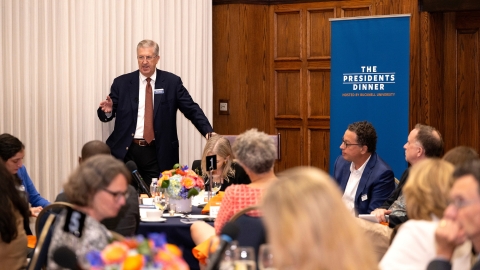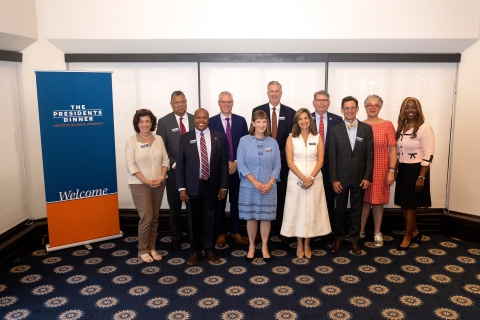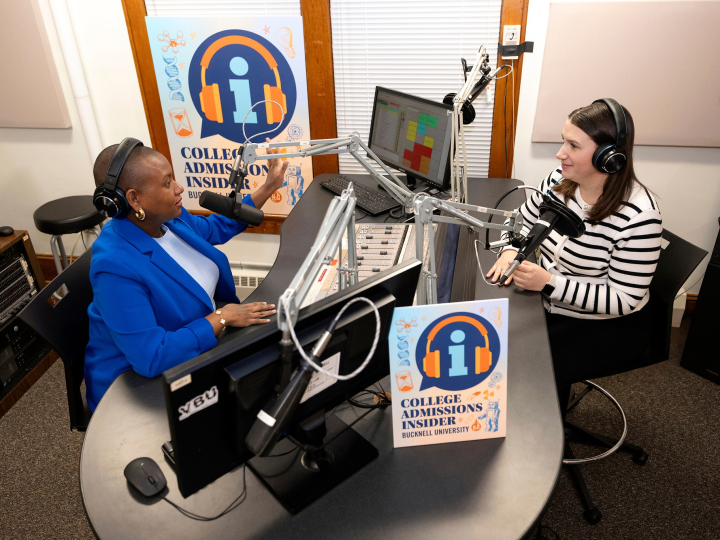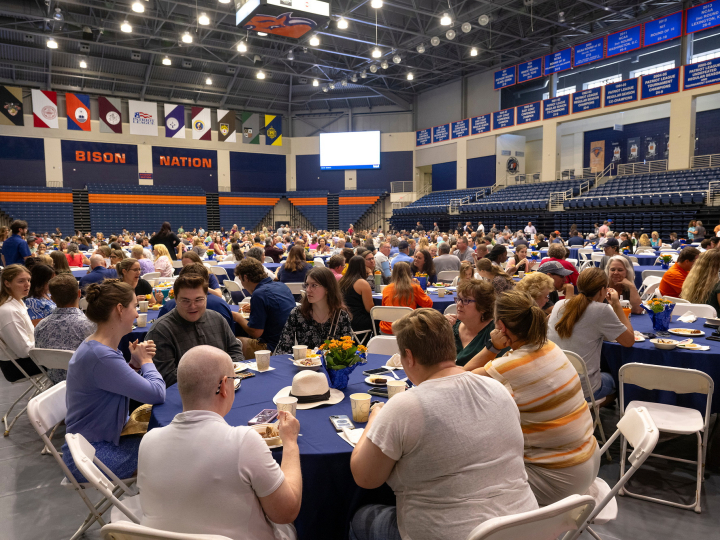
Bucknell, Bravman Host Record Media Turnout at Presidents Dinner
September 8, 2025
President John Bravman annually leads the on-the-record dinner discussion at The Presidents Dinner. Photo by Emily Paine, Marketing & Communications
They didn't come to Washington, D.C., to solve all the problems facing higher education. But for nearly two hours inside the storied halls of the National Press Club, 11 college presidents did their best to take on the big questions from a record number of journalists covering the academy during the eighth annual Presidents Dinner, hosted by Bucknell and emceed by President John Bravman.
The wide-ranging, on-the-record conversation unfolded before nearly 30 members of the national media — more than any year prior — and included participation from reporters and editors representing ABC News, The New York Times, The Wall Street Journal, NPR, USA TODAY, and other leading outlets. Their presence signaled both the urgency and intensity of the issues confronting higher education at the start of a new academic year.
A Gathering of Influential Leaders

2025 Presidents Dinner Participants (L to R), Row 1: Maud S. Mandel, Williams College; Garry W. Jenkins, Bates College; Alison Byerly, Carleton College; Julie Kornfeld, Kenyon College; Steven Tepper, Hamilton College. Row 2: Vincent D. Rougeau, the College of the Holy Cross; William C. Dudley, Washington and Lee University; John Bravman, Bucknell University; Doug Hicks, Davidson College; G. Gabrielle Starr, Pomona College; Carmen Twillie Ambar, Oberlin College & Conservatory. Photo by Emily Paine, Marketing & Communications
Joining Bravman were presidents Garry W. Jenkins of Bates College, Alison Byerly of Carleton College, Vincent D. Rougeau of the College of the Holy Cross, Doug Hicks of Davidson College, Steven Tepper of Hamilton College, Julie Kornfeld of Kenyon College, Carmen Twillie Ambar of Oberlin College & Conservatory, G. Gabrielle Starr of Pomona College, William C. Dudley of Washington and Lee University, and Maud S. Mandel of Williams College.
Together, they fielded pointed questions about the future of higher education — from looming enrollment declines, to the national conversation about diversity and inclusion, to affordability and access — offering candid insights into the challenges and opportunities shaping their campuses.
Bravman set the tone with a reflection on why the presidents keep returning to this dinner, year after year.
"While change is inevitable, and this year has brought a lot of change to higher education, we all continue gathering here and continue serving our institutions year after year because of the enduring value and critical role of colleges and universities in our society and world," Bravman said. "While this work is challenging, it remains incredibly rewarding."
His own concerns loomed large in the discussion. Chief among them: the so-called "enrollment cliff" — the sharp decline in the number of traditional college-aged students expected to begin next year. Just as troubling, he noted, are the federal funding cuts and freezes now threatening critical research in medicine, engineering and the sciences.
"Most people don't understand that the vast majority of scientific, engineering and medical research has been funded by the federal government, at least since World War II," Bravman said. "And so the vulnerability that comes with that is enormous. In engineering, science and medicine, very little comes from the private sector and industry, and most comes from the federal government, and so when that changes, that’s a titanic shift in how we can do science."
His remarks came just a day after a federal judge ruled that the Trump administration unlawfully terminated $2.2 billion in research grants awarded to Harvard University — a reminder of how deeply federal decisions can ripple across higher education.
A Diversity of Challenges
Another thread of the evening wrestled with higher education's role in shaping democracy today. Oberlin's Ambar pushed back against critiques that students are increasingly unwilling to hear opposing views.
"I do think that the critique of college students as sort of unwilling to listen to different peoples' perspectives, I find that a little frustrating because they are 18, 19, 20 and 21 years old, trying to figure out how to have very difficult conversations," she said. She argued that the campus climate reflects, rather than drives, divisions in American life.
"To hold them up as the reason why things are failing when people can't have conversations around their Thanksgiving dinner table — and we don't see Congress doing any better — they're a reflection of what's happening in society," she said. "Our superpower as a nation is that we’re a multicultural society that's grappling with these difficult, complex issues. One of the reasons people seek out coming to this nation is because of our multicultural framework, and this question of how we have conversation across differences and these challenges are what we're grappling with on a college campus."
The diversity of challenges facing higher education carried the night. And while the presidents didn't find consensus on solutions to every challenge, they offered clarity, candor and perspective to a roomful of reporters eager to understand the shifting dynamics of higher education.

